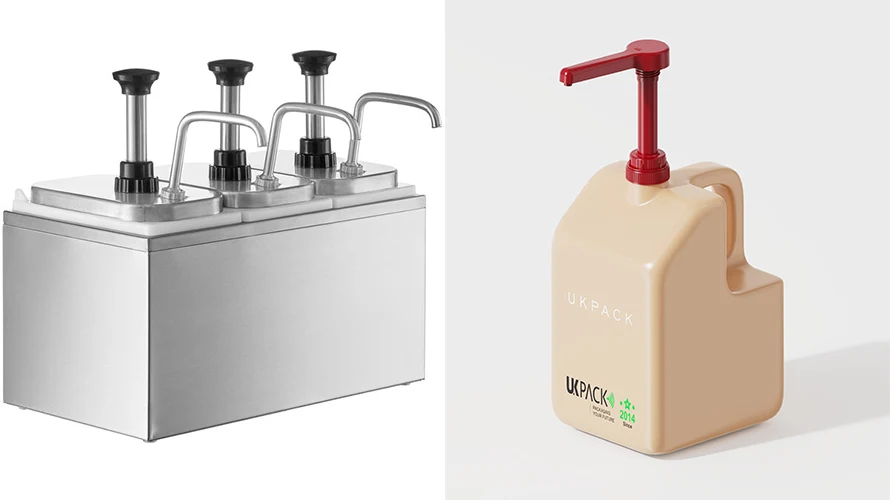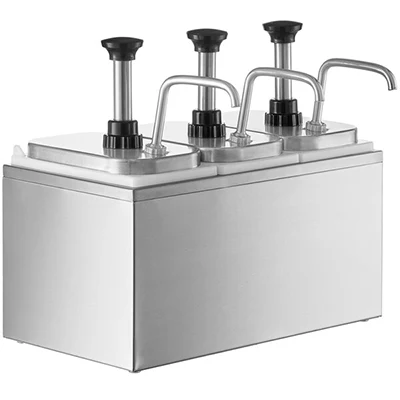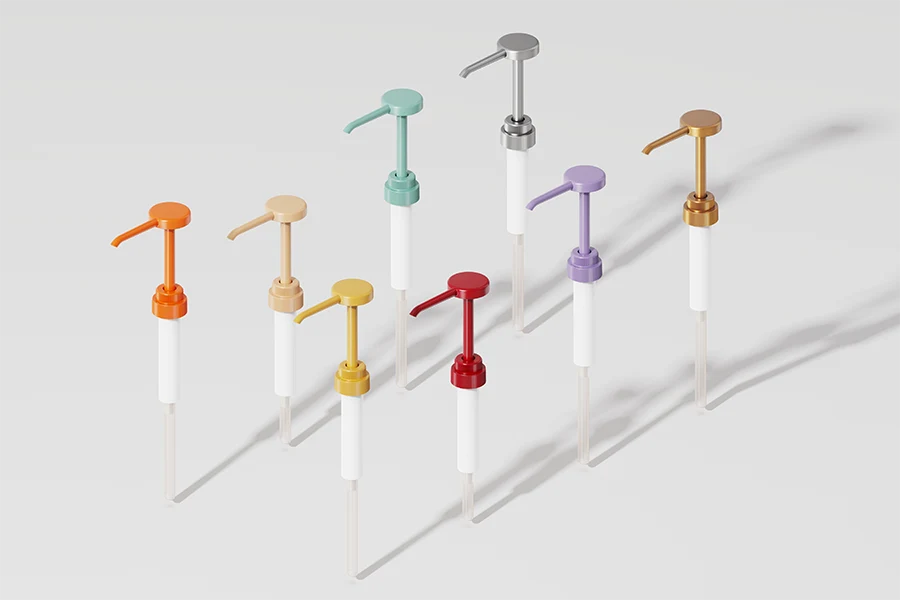Stainless Steel vs Plastic Sauce Pumps: Which One Should You Choose?

Founder of UKPACK, Chief Packaging Designer with 18 years of experience, Red Dot Award Winner
Specialize in custom, innovative, and sustainable packaging solutions for cosmetics, skincare, personal care, hair care, food and beverage, and more.

- Why Material Matters for Sauce Pumps: Key Performance Factors
- Stainless Steel Sauce Pumps: The Premium Countertop Choice
- Plastic Sauce Pumps: The Versatile & Cost-Effective Option
- Side-by-Side Comparison: Stainless Steel vs. Plastic at a Glance
- Choosing the Right Pump for Your Business: Key Decision Factors
- He aha te UKPACK Ka taea te awhina
- Conclusion: Making Your Informed Choice
In the foodservice industry, choosing between stainless steel and food-grade plastic for your sauce pump is critical for operational efficiency, food safety, and return on investment. Both primary materials offer distinct advantages in durability, ease of cleaning, and ideal applications.
This article will thoroughly compare the characteristics of stainless steel and plastic sauce pumps, helping you make an informed decision that best suits your business needs.
Why Material Matters for Sauce Pumps: Key Performance Factors
A pump’s material choice is more than just aesthetics; it fundamentally impacts durability, maintenance, food safety, and overall cost-effectiveness. In high-traffic restaurants, where condiment pumps are pressed hundreds of times daily, the material quality directly dictates how well the pump withstands such heavy, continuous use. An unsuitable choice could lead to frequent replacements, potential hygiene issues, or even serious safety concerns.
Below, we break down how both stainless steel and plastic pumps perform across these crucial factors:
- Durability and Lifespan: How long can the pump consistently perform under demanding commercial use without failing?
- Ease of Cleaning & Hygiene: Is it simple to sanitize regularly? Does it resist bacteria growth and absorb odors?
- Food Safety Compliance: Does the material react with food or leach harmful chemicals? Are there necessary certifications (e.g., NSF, FDA) ensuring its safety for various sauces and syrups?
- Cost & Value: What is the initial upfront cost versus the total long-term cost of ownership, considering potential replacements?
- Appearance & Customer Perception: Does the pump project a professional image on a countertop or self-serve station, aligning with your brand?
- Use Case Suitability: Is it best suited for high-volume buffet lines, a small café’s coffee syrup station, or a back-of-house operation?
Stainless Steel Sauce Pumps: The Premium Countertop Choice

Stainless steel sauce pump dispensers are a hallmark in commercial condiment stations, widely recognized for their robustness and longevity. These metal pumps represent a premium individual countertop choice in foodservice settings. Let’s explore the pros and cons of stainless steel sauce pumps:
Advantages (Pros) of Stainless Steel Sauce Pumps:
- Exceptional Durability: Stainless steel is celebrated for its inherent strength and resilience. These freestanding pumps are engineered to endure heavy daily use, resisting cracking or failure. A high-quality stainless steel pump can often outlast 5-10 plastic pumps, easily lasting 3-5 years or even longer in busy settings with proper maintenance. This makes them an ideal solution for high-volume and long-term operations where multiple individual dispensers are in constant use.
- Hygiene & Easy Cleaning: The non-porous metal surface of stainless steel prevents it from harboring bacteria or absorbing sauce odors and colors, crucial for maintaining distinct flavors and hygiene across multiple condiments. Stainless pumps can tolerate high heat and strong cleaning chemicals, allowing for thorough sanitization, and most models are dishwasher safe. This ensures strict compliance with food safety standards. Reputable stainless pumps are frequently NSF certified for sanitation and made from food-grade materials that do not react with acidic or creamy condiments.
- Food Safety & Inertness: Stainless steel is an inert material, meaning it will not react with sauces or leach chemicals into your product. This is crucial for maintaining the integrity of items like tomato ketchup, vinegar-based dressings, or acidic hot sauces. High-end stainless steel individual dispensers are typically FDA-approved for food contact and may also comply with European regulations (e.g., LFGB), offering peace of mind in both US and EU markets.
- Professional Appearance: The sleek, polished look of stainless steel pumps conveys an undeniable sense of quality and professionalism. In customer-facing applications, such as a luxurious hotel breakfast buffet or an upscale café condiment station, multiple metal pumps enhance your brand image and contribute to a premium and stylish ambiance for the entire condiment array.
- Long-Term Value: While the initial cost of each stainless steel pump is higher than plastic alternatives, they often offer a lower total cost of ownership over time. Their exceptional longevity means fewer replacements, saving money and reducing waste in the long run. From a sustainability perspective, using one durable pump for years (instead of numerous plastic ones) significantly lowers environmental impact.
- Ideal Use Cases: Stainless steel pumps truly shine in high-volume and upscale environments. Stainless steel pumps shine in busy restaurants, banquet halls, and large cafeterias where these robust individual countertop dispensers will be used constantly and must perform reliably. For instance, a luxury hotel buffet serving hundreds of guests daily might exclusively use individual stainless steel pumps for various dressings and sauces, ensuring durability and a pristine presentation. Likewise, franchised fast-casual chains may choose stainless for back-of-house sauce distribution due to heavy wear and the need for absolute cleanliness for each distinct condiment.
Disadvantages (Cons) of Stainless Steel Sauce Pumps:
- Heavier Weight: A minor drawback is their weight – stainless pumps are heavier than plastic. This is generally not an issue once each unit is installed on a counter, but it is a factor to consider for portability or if employees frequently move them.
- Higher Upfront Cost: The primary disadvantage is the higher initial price point per unit. Not every small business can invest in numerous stainless steel pumps at once. However, for those who can, the combined durability, prestige, and long-term value often justify the expense.
Plastic Sauce Pumps: The Versatile & Cost-Effective Option

Plastic sauce pumps are extremely prevalent in the foodservice industry, particularly in situations prioritizing cost-effectiveness and high turnover. Typically made from food-grade polypropylene, these pumps with standard jug adapters are a common sight. Here’s an overview of the advantages and disadvantages of plastic sauce pumps:
Advantages (Pros) of Plastic Sauce Pumps:
- Affordable & Cost-Effective: Plastic pumps boast a significantly lower upfront cost compared to stainless steel. This makes them highly attractive if you need many individual pumps for separate sauces across multiple condiment stations or operate within a limited budget. For small businesses or new cafés, the low cost lowers the barrier to entry for acquiring functional sauce dispensers.
- Lightweight & Portable: These pumps are considerably lighter, offering an advantage for staff who need to install or move them frequently. They also place less strain on portable condiment stations or disposable containers. If you’re catering an event or regularly rearranging a self-serve counter, multiple individual plastic pumps offer unmatched convenience.
- Food-Grade Material (Safety): Quality plastic pumps are manufactured from food-grade plastics like polypropylene (PP). It is crucial to ensure any individual plastic dispenser is BPA-free and certified safe for food contact. Reputable suppliers provide comprehensive safety test reports, including FDA compliance, California Proposition 65 (CP65) reports, Phthalate-free certificates, and EU Regulation 1935/2004 compliance. This guarantees the plastic will not leach harmful substances into ketchup, mustard, syrups, or other condiments.
- Variety of Styles & Sizes: Plastic pumps offer exceptional versatility. They can be molded into various designs and colors and feature different neck finishes to fit a wide range of containers, from syrup bottles to gallon jugs. You can find plastic pumps in diverse output volumes (5ml, 10ml, 30ml per pump) and designs, ensuring a suitable individual option for almost any sauce dispensing application.
- Ergonomic Design: Many plastic pump models prioritize user comfort. Features like wide pump heads or easy-to-press grips require minimal effort, which is beneficial for self-serve stations used by customers of all ages, or for employees repeatedly pumping sauces. The pumping mechanism in well-designed plastic units is often very smooth.
- Easy Maintenance: Plastic pumps are generally designed for easy disassembly and cleaning. While many are top-rack dishwasher safe, manufacturers often recommend hand-washing to prolong their lifespan, as excessive heat can potentially warp some plastic parts or wear out seals. Smooth plastic surfaces are also relatively easy to wipe clean, though deep-colored sauces may cause slight staining over time.
- Decent Durability (Short-Term): Modern food-grade plastics are quite durable for regular use. An individual plastic pump can reliably serve for months before wear and tear necessitate replacement. Typically, you can expect 6-12 months of heavy daily use from a plastic sauce pump. They are sturdy enough for most small to medium operations but are not as long-lasting as stainless steel.
- Good for Scale & Temporary Use: Plastic pumps are perfect for seasonal businesses (e.g., a summer food truck) or short-term events, as individual units are inexpensive and easily replaceable afterward. For low-volume venues like a small coffee kiosk or a neighborhood diner, plastic pumps can last sufficiently long given moderate usage. They are also common as backup pumps or spare units due to their affordability.
- Ideal Use Cases: Plastic pumps are excellent for small and medium businesses or budget-sensitive operations. For example, a busy take-out fast-food stand or an independent café might choose individual plastic pumps for ketchup, mustard, and mayonnaise to save on costs. A self-serve salad bar in a cafeteria could use separate plastic pumps for various dressings – they’re economical and can be quickly swapped out if one breaks without affecting the other sauces. Essentially, for day-to-day condiment dispensing where ultra-long durability is not critical, plastic pumps are a highly practical choice.
Disadvantages (Cons) of Plastic Sauce Pumps:
- Higher Long-Term Cost (with Replacements): Due to their shorter lifespan, plastic pumps require regular replacement, often yearly or even more frequently in busy fast-food outlets. When budgeting for multiple individual units, it’s essential to remember that while each unit is cheap, the cumulative cost of replacing numerous pumps annually can approach or exceed the cost of a single stainless pump over time.
- Less Eco-Friendly (Frequent Replacement): Frequent replacement of individual units leads to more plastic waste, making it a less environmentally friendly option compared to a single, long-lasting stainless steel pump.
Side-by-Side Comparison: Stainless Steel vs. Plastic at a Glance
To simplify your decision-making process, here’s a quick comparison of stainless steel and plastic sauce pumps on key points:
| Factor | Stainless Steel Sauce Pumps | Plastic Sauce Pumps |
|---|---|---|
| Durability | Exceptionally durable, lasting years under heavy use; minimizes frequent replacements. | Sturdy but designed for shorter-term use (typically months); may need regular replacements. |
| Maintenance & Cleaning | Tolerates high heat and harsh chemicals; easily sterilized in commercial dishwashers; non-porous surface ensures strong hygiene. | Easy to clean but requires more care; often hand-washed to avoid heat/chemical damage; still hygienic if maintained properly. |
| Food Safety | Naturally non-reactive; usually certified for food use (NSF/FDA/LFGB). | Must be food-grade, BPA-free; always check FDA or EU compliance certificates; only safe if sourced from reputable suppliers. |
| Cost Considerations | Higher upfront cost, but long-term value as replacements are rare. | Much cheaper upfront (a few dollars each), but frequent replacements can make it more expensive over years. |
| Aesthetics & Branding | Sleek, professional appearance; ideal for upscale or modern décor (cafés, hotels, buffets). | Typically white/colored; fine for casual eateries (fast food, diners) but less premium in luxury settings. |
| Environmental Impact | One pump can last 5+ years, reducing plastic waste and offering long-term sustainability. | Can be recyclable, but shorter lifespan means more waste; lower carbon footprint in production but higher turnover. |
| Use Case Fit | Best for high-volume, upscale, or heavy-duty settings (cafeterias, cinemas, hotels). | Best for small to medium businesses, temporary setups, or budget-sensitive operations (ice cream shops, food trucks). |
Choosing the Right Pump for Your Business: Key Decision Factors
Now that we’ve thoroughly reviewed both materials, how do you decide which one is right for your business? Consider these crucial questions to guide your choice:
- What’s your volume of usage? High-volume operations (hundreds of pumps daily for each sauce) will benefit from the longevity of stainless steel countertop pumps. Low to medium volume can comfortably use plastic pumps.
- What’s your budget? If you need many individual pumps but have a limited upfront budget, plastic is the sensible choice. If you can invest more now for long-term value or only need a few pumps, stainless steel might offer a better return over time.
- What’s the environment like? For upscale or front-of-house use where appearance is paramount (e.g., hotel buffet, gourmet café), stainless steel individual dispensers shine. For casual or back-of-house use (fast-food kitchen, school cafeteria lines), plastic’s functional look is perfectly acceptable.
- How important is ease of maintenance? If your staff can meticulously clean equipment, individual plastic pumps can remain sanitary. If you need pumps that can be tossed into any commercial dishwasher without worry, stainless steel is more forgiving.
- Do you require any specific certifications? Some franchises or health departments may mandate NSF-certified dispensers, which often means stainless steel. However, many plastic pumps (including ours) also come with all necessary food safety certifications, ensuring compliance with the right product choice for each condiment.
- Will you need to frequently change pumps or move them around? If so, the lightweight nature and low cost of individual plastic pumps may outweigh the hassle of moving heavier stainless steel units. Plastic pumps are also excellent for temporary setups (catering events, food festivals) where they might be discarded or lost after use.
What UKPACK Can Help

If you determine that plastic pumps align with your business needs – as they do for many successful operations – it is paramount to choose high-quality pumps from a trusted supplier. UKPACK specializes in premium plastic sauce pumps and offers a comprehensive, one-stop solution for all your condiment dispensing requirements. Here’s what sets our plastic pumps apart:
- Food-Grade, Safe Materials: We meticulously use premium food-grade polypropylene (PP) and other durable plastics that are consistently BPA-free and compliant with both U.S. and EU food contact regulations. We provide complete, transparent testing and safety reports for every product, including FDA certification, California Prop 65 (CP65) compliance, Phthalate-free verification, and EU 1935/2004 food-contact regulation reports. These certifications ensure our individual pumps meet the highest safety standards, giving you and your customers complete confidence.
- Durable Construction: Our plastic pumps are engineered for maximum durability within their class. While made of plastic, they are far from flimsy. Each pump is designed to withstand the rigors of daily commercial use. We reinforce stress points and utilize high-quality springs, ensuring smooth operation for months without leaking or breaking. Many of our clients report that our individual pumps comfortably last well beyond the typical 6-12 month lifespan for standard plastic pumps.
- Easy to Clean & Maintain: Our pumps are designed for quick disassembly, allowing for thorough cleaning. The plastic components are sturdy enough to handle regular cleaning (just avoid extreme heat). This ease of maintenance helps keep your condiment station hygienic with minimal effort, especially when managing multiple distinct sauce pumps. The materials also resist staining – even with colorful sauces like chili or soy sauce, a quick rinse often restores the pump’s clean look.
- Ergonomic & User-Friendly Design: We prioritize ergonomic design. The pump head is easy to press with the palm, requiring minimal force, which is particularly important in self-serve scenarios or during busy rush hours. The spout is engineered to provide a clean cutoff with no drips, keeping counters and customers’ hands clean. An ergonomic design translates to faster, more comfortable service and happier users.
- Wide Range of Options (One-Stop Solution): We offer a diverse variety of pump models to suit any container or portion size you require. Whether you need pumps for a 1-gallon ketchup jug, a countertop syrup bottle, or a large sauce dispenser station, we have compatible pumps with the right neck finish and tube length. Our product line includes multiple output volumes (from 5ml up to 30ml per stroke) to ensure precise portion control for different sauces. With various styles and even color choices, you can maintain a consistent look across your condiment stations. Think of it as a one-stop shop – you won’t need to mix and match brands or worry about compatibility, because we likely have the exact individual pump for your specific container and use case.
- Competitive Pricing and Support: Despite their high quality, our pumps are affordably priced. We aim to offer the best value, providing durable, safe pumps without breaking your budget – crucial for budget-conscious businesses. Additionally, our dedicated team offers full support, from assisting you in selecting the right pump size to providing after-purchase service. In short, you receive cost-effective products coupled with expert guidance, ensuring a seamless experience.
- Trusted by International Clients: Our sauce pumps are currently used by restaurant chains, cafes, and catering companies across North America and Europe, our primary markets. We bring years of expertise in packaging and dispensing solutions, so you are in good hands. By choosing our pumps, you leverage our extensive experience as an industry leader in sauce dispensing technology.
Conclusion: Making Your Informed Choice
Choosing between stainless steel and plastic pumps ultimately depends on your specific operational needs and priorities for individual condiment dispensing. Stainless steel pumps offer longevity, heavy-duty performance, and a premium aesthetic, making them ideal for high-volume, upscale environments requiring top-tier reliability for each distinct sauce.
Conversely, plastic pumps provide affordability and versatility, perfect for daily applications in fast-food, cafés, and catering where cost and convenience are paramount for multiple individual units.
For many businesses, our high-quality, food-safe plastic pumps strike an ideal balance of reliability and cost-effectiveness. They are easy to use, simple to maintain, and come with all necessary safety assurances, effectively narrowing the performance gap with stainless steel.
Evaluate your specific scenario using the factors discussed. A mixed approach, deploying stainless steel for premium sauces and plastic for others, can also be highly beneficial. Whichever pump you choose, prioritize well-made and certified products to ensure smooth operations, happy customers, and overall efficiency.
For deeper insights into sauce pump selection, usage, and maintenance, refer to our comprehensive sauce pump guide.
